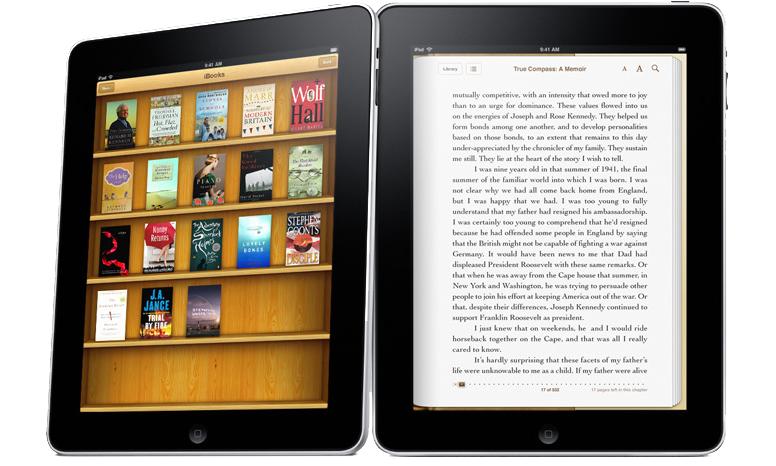Defending itself from U.S. Department of Justice allegations of e-book price fixing, Apple on Tuesday pointed to the diverse contract terms it made with five major publishing houses as evidence against purported conspiracy.
A follow-up report to yesterday's proceedings from AllThingsD says Apple lawyer Orin Snyder brought up the negotiated terms multiple times during the bench trial now in front of U.S. District Court Judge Denise Cote.
The composition of Apple's agreements with five of the biggest book publishers in the world is central to the Justice Department's antitrust argument, which holds that the companies worked hand-in-hand to falsely inflate e-book prices in the iBookstore. At the core of Apple's pricing strategy was a so-called "most favored nations" clause that allows publishers to set e-book pricing, but precludes them from selling the same content to other retailers at a lower price.
“[Apple's MFN] was not structured like a standard MFN in favor of a retailer, ensuring Apple that it would receive the best available wholesale price,†the DOJ said in its complaint. "Instead of an MFN designed to protect Apple’s ability to compete, this MFN was designed to protect Apple from having to compete on price at all, while still maintaining Apple’s 30 percent margin.â€
The government contends that by having the MFN deals in place, Apple and its cohorts willingly conspired to hike e-book prices. As noted by AllThingsD, such a scheme would likely call for similar, if not identical, terms for each publisher. As revealed in court, however, the arrangements were widely varied.
Snyder pointed out that, while a price-matching provision was included in each contract, Apple negotiated different MFNs for each of the five publishers.
On Tuesday, Penguin Books CEO David Shanks, whose company is one of the five involved in the case, said there was some concern over market leader Amazon's wholesale pricing model. The online retail giant's strategy is counter to Apple's "agency model" in that it puts pricing power in the hands of book resellers by allowing them to sell content at or below cost.
"What transpired was by having e-books now at $9.99, it was cannibalizing hardcover editions, which sold on average at $26," Shanks said, referring to Amazon's strategy.
While his testimony was at times damning to Apple's case, Shanks did say that Penguin "strongly resisted" the MFN model, fearing Apple would simply match Amazon's already low prices and add a commission on top.
While not a silver bullet, the revelation is likely to bring some scrutiny of the DOJ's assertions.
The trial is set to continue for the next three weeks, with high-ranking executives like Apple's vice president of Internet Software and Services Eddy Cue set to take the stand.
 Mikey Campbell
Mikey Campbell

-m.jpg)






 William Gallagher
William Gallagher
 Andrew O'Hara
Andrew O'Hara
 Wesley Hilliard
Wesley Hilliard

 Malcolm Owen
Malcolm Owen
 Marko Zivkovic
Marko Zivkovic

 Chip Loder
Chip Loder




-m.jpg)




26 Comments
Of course now that evidence from both sides comes out things aren't so clear-cut anymore.
Sorry but that is a bogus excuse, if they don't want their high priced hard cover books cannibalized then don't offer that book in e book format until they are done with their hard cover. Further maybe people do not prefer hardcover books.
It still does not remove what Apple did in their contract of making the publishers set up contracts that forbid other businesses from selling books at a lower price than Apple.
That is price fixing at its finest, no if ands or buts about it.
[quote name="Victory2013" url="/t/157879/apple-argues-diverse-book-publisher-contracts-prove-non-collusion-in-doj-suit#post_2339526"]Sorry but that is a bogus excuse, if they don't want their high priced hard cover books cannibalized then don't offer that book in e book format until they are done with their hard cover. Further maybe people do not prefer hardcover books.[/QUOTE] So the only two options you see are don't sell eBooks or don't complain when the monopolistic retailer dumped that at a significant loss to corner a market and running their product's value? :rolleyes: [QUOTE]It still does not remove what Apple did in their contract of making the publishers set up contracts that forbid other businesses from selling books at a lower price than Apple. That is price fixing at its finest, no if ands or buts about it. [/quote] MFN is not illegal. It's also not what the DoJ is arguing so you lose on both fronts.
Sorry but that is a bogus excuse, if they don't want their high priced hard cover books cannibalized then don't offer that book in e book format until they are done with their hard cover. Further maybe people do not prefer hardcover books.
It still does not remove what Apple did in their contract of making the publishers set up contracts that forbid other businesses from selling books at a lower price than Apple.
That is price fixing at its finest, no if ands or buts about it.
The publisher could set the price to anything they wanted, just had to sell them for no more than that on iBooks.
Since Apple did not set the price, this is absolutely NOT price fixing (at it's finest or otherwise...)
[quote name="Victory2013" url="/t/157879/apple-argues-diverse-book-publisher-contracts-prove-non-collusion-in-doj-suit#post_2339526"]Sorry but that is a bogus excuse, if they don't want their high priced hard cover books cannibalized then don't offer that book in e book format until they are done with their hard cover. [/quote] I thought I read that Amazon coerced the publishers into an early release of ebook titles? (If you don't let us sell the ebook now, we won't sell your hardcover book at all) Someone with a better memory or more knowledge please help me out on this.